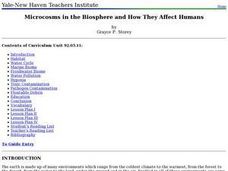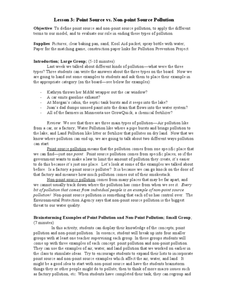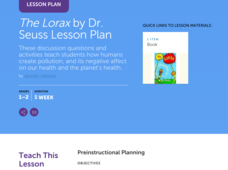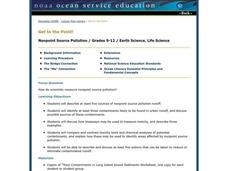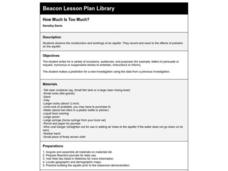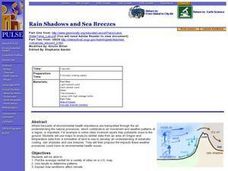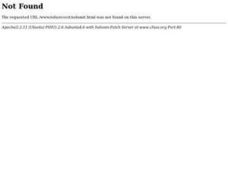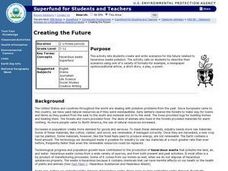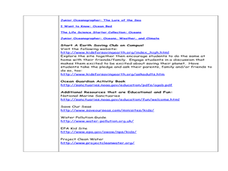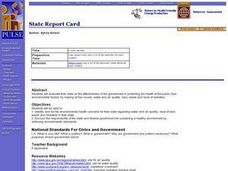Curated OER
Rice Farming
Third graders investigate how farmers get more rice from their land. In this farming lesson, 3rd graders discover things that farmers to do produce more rice. Students study photosynthesis and illustrate pictures about it. Students test...
Curated OER
Our Earth
In this Earth's environment worksheet, students complete a crossword puzzle given 35 clues about a variety of topics related to our Earth. Topics include ecosystems, precipitation, biomes, energy transfer, soil, weathering and rocks.
Curated OER
Science: Microcosms in the Biosphere
In a series of lessons, examine the impact on humans by microcosms in the biosphere. Among the plans structured for students with different abilities and learning styles, are activities describing the symbiotic relationship, drawing the...
Curated OER
Point Source vs. Non-point Source Pollution
Students define and differentiate between point source and non-point source pollution. Students discuss various types of pollution including air, water and land pollution, analyze demonstrations and complete a worksheet.
Curated OER
Runoff: Intro to Watersheds
Students are taught that a watershed is, what types of basic land cover are impermeable and permeable to water. They trace the flow of water around their school and around their home. Students determine what watershed their school is a...
Curated OER
Keep the Environment Clean
Students discuss ways our environment becomes polluted. They make a list of ways to keep it clean.
Scholastic
The Lorax by Dr. Seuss Lesson Plan
Celebrate the whimsical world of Dr. Seuss with a lesson that features the memorable tale of The Lorax. After listening to a riveting read-aloud, scholars take part in a grand conversation about the story and environment. Then they...
Curated OER
Get to the Point!
Students write out sources of pollution and identify contaminants are most likely found in urban runoff. In this pollution lesson students compare toxicity tests and chemical analysis of potential contaminants.
Curated OER
HOW MUCH IS TOO MUCH?
Students observe the construction and workings of an aquifer. They record and react to the effects of pollution on the aquifer.
Curated OER
Rain Shadows and Sea Breezes
Young scholars plot the average rainfall for a variety of cities in the United States. Using the map, they work together to determine patterns on which toxicants are transported through the air. They determine the impacts of various...
Curated OER
Land Use Change Introduction
Students discuss the major changes that have taken place in the Hudson Valley over the past 400 years. They use aerial photos to describe major trends in Dutchess County. Students view a PowerPoint presentation. They work in small groups...
Curated OER
Where Does Al the Waste Go?
Students construct a sanitary mini-landfill and an open mini-dump. Over a thirty day period, they compare the two methods and determine landfills are envorinmentally safer. They observe a demonstration of burning waste. They create...
Curated OER
Creating the Future
Students work together to develop and write scenerios for the future of hazardous waste cleanup. They share their scenerios with the class. They complete activities as well.
Curated OER
Environmental Education
Second graders examine how their choices affect the environment. They identify different types of pollution and its source. They ask questions to end the lesson.
NOAA
The Dead Zone
The fifth installment of a 23-part NOAA Enrichment in Marine sciences and Oceanography (NEMO) program defines dead zones and how they form. Pupils then examine data from the Gulf of Mexico to determine dead zone formation.
Curated OER
I Can Preserve My Planet
Students explore renewable and nonrenewable resources. For this ocean preservation lesson, students use KWL charts to understand ways the ocean is important to our daily lives. Students create a poster or wirte a letter to someone...
Illinois Department of Natural Resources
Section Four: How Can We Protect Biodiversity?
Look into the future with a lesson plan on biodiversity and natural habitats. Learners read articles about different perspectives when it comes to planning future development, and decide which angle is the highest priority in a group...
Curated OER
Arctic cleanup
Ninth graders examine pollution problems and how it affects the community. In this arctic cleanup lesson students study ocean currents and how they affect pollution.
Curated OER
State Report Card
Twelfth graders evaluate their own state on how well the government protects their citizens from specific health issues. In groups, they list the environmental health concerns regarding water, air, toxic waste and radiation. They...
Curated OER
Materials: Hidden Costs, Mapping the Source and Cost of Raw Materials.
Students map connections among raw materials. In this environmental stewardship lesson plan, students design strategies to minimize the use of raw materials and discuss how to use more sustainable materials.
Curated OER
Arbor Day
First graders study the importance of trees to our environment. they make their own version of the story by completing the following sentence and then completing an illustration for their writing. "A tree can be ______."
Curated OER
Earth Day
Students participate in activities that familiarize them with what Earth Day is, why it is important, and why it is a celebration.
Curated OER
Global Resources: What Will You Do with Your Power?
Learners examine the human impact on natural resources. They read and discuss an article, evaluate nations regarding their environmental problem-solving, develop a presidential speech on the environment, and conduct a natural resources...
Curated OER
Interactions Everywhere!
Students examine interactions within the environment and environmental engineering careers. They discuss and view photos of natural and manmade environments, explore various websites, create a web to identify interactions between living...




